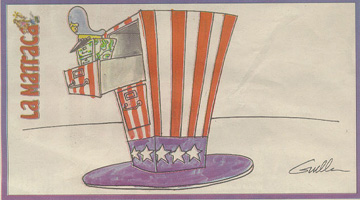
Guatemalan people still waiting for most important apologies;
US, rebels regret civil war roles, but government has yet to speak
By Richard Chacon
Boston Globe, March 14, 1999

GUATEMALA CITY - After enduring decades of conflict that have shattered families and destroyed communities, the people of this war-ravaged country are finally being asked for forgiveness.
The first apology was issued on Wednesday, when President Clinton, in a four-day trip through Central America, acknowledged that the United States had made a "mistake" in supporting a repressive, right-wing government during its 36-year civil war, which claimed 200,000 victims.
The second was made on Friday, when the Guatemalan National Revolutionary Unity, the leftist rebels who had fought the government, issued a statement asking for forgiveness "from the memory of victims, their families and communities."
Now, residents say, they want to hear from their own government and from the military, which carried out the most brutal attacks during the war.
"If the US government can recognize what they did, then the army they supported should recognize what they did, too," said Helen Mack, a Guatemalan human rights activist who runs a foundation named for her sister, Myrna, an anthropologist who was killed during the war.
Even Hector Mauricio Lopez Bonilla, a retired army lieutenant colonel, said an apology from the military would be an important step toward healing the country's wounds.
"But it must come from someone high up, someone who was involved in what happened," said Lopez Bonilla, who helped negotiate the peace accords that were signed in 1996 and now works for a political consulting firm. "It would be a great act of maturity by the military."
Much of the new openness being heard in this country about the conflict is a result of the findings from a national truth commission report released last month. The report, which was sponsored by the United Nations, accused both sides of committing atrocities during the war, but it blamed the US-backed government and military for 90 percent of the deaths.
The commission has no authority to bring those responsible for the killings to trial, but it urged the government to begin a formal investigation and remove those army officers who were responsible for the deaths.
President Alvaro Arzu has not released a formal reponse to the report, but observers said a reply could come this week.
Many here, however, say that a full recovery will require more than just official expressions of regret.
As part of its support for the peace accords, the Clinton administration will provide $25 million this year for literacy training and for local government projects that promote citizen participation.
After Clinton's statement, however, some activists and residents called for reparations to be made to the victims' families, and they have called for a class-action lawsuit against the US government.
Other officials say that despite years of peace, human rights abuses have not disappeared in Guatemala.
The most notable recent example they cite is last year's slaying of Roman Catholic Bishop Juan Gerardi Condera, who was bludgeoned two days after he presented a similar report. Although the investigation continues, church officials have blamed the military for Girardi's death.
For Alma Monterojas, the loss of her cousin 15 years ago in the war is a burden she still carries. Every day, she said while selling roses on the Avenida La Reforma, is a battle to make ends meet, to care for her family, to try to make sense of the madness that had gripped her country for so long.
"It's been 15 years but I still wonder why," Monterojas said of her lost cousin. "He was not a political person, but he died in a political war."
She said she was pleased by Clinton's apology, but wondered how - or if - it would help her daily struggle.
Likewise, some leaders say Guatemala's biggest challenge today is to rebuild the country's government institutions to better serve its diverse communities of indigenous people who descend from the legendary Maya civilization.
In the civil war, the Maya were targeted by the military. Since, they have generally languished at the bottom of the economic heap.
"Human rights abuses have changed from being active violations by groups to more hidden forms of neglect by government," said Marta Altolaguirre, a member of the presidential rights commission. "We have many communities that haven't had adequate government services for three decades."
Jean Arnault, the UN's special representative in Guatemala, said the country's growing crime rate was another threat to building a lasting democracy. This threat, Arnault said, could be solved only by a rebuilt criminal justice system.
"People expected peace to deliver peace," Arnault said. "Recovery will always be an uphill battle so long as public safety remains remains a top issue."